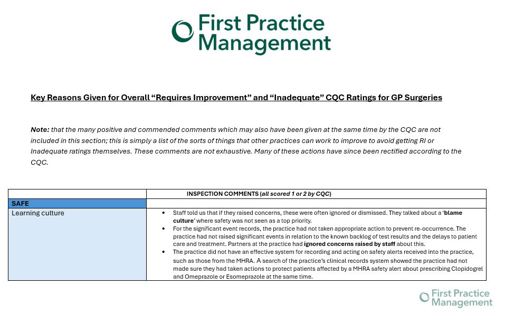
In our new monthly report, FPM looks in detail at what the CQC have reported from their GP practice inspections during October 2025. Using publicly available reports on the CQC website, we highlight some of the behaviours that won practices Outstanding ratings, and the reasons some practices were scored Requires Improvement, or Inadequate. Do you recognise any of the observations the CQC picked up, either good or bad? Do you think the CQC's findings are fair?
Going forward, these reports will only be sent out in our refreshed FPM Group newsletter - sign up here to be on the mailing list!
Yet again, the Quality Statement receiving most poor scores and criticism was "Medicines Optimisation", under the "Safe" Key Question.
Coming close behind was "Governance, management and sustainability" (although it is worth noting that many of these comments are summaries of comments made in other quality statements, elsewhere in the report).
Policies and Compliance
The most common theme was Policy and compliance. One of the most common observations from the CQC was that a practice had "no formal policy" on a topic, and where there was one, it was "not consistently implemented". Sometimes, although a practice had templates for risk assessments and other necessary documents, they were not filled in, or incomplete.
Our market leading compliance software FPM Core lets you know who has read what policies, and when, so you are always up to date with compliance - click here to book your demo today
As with last month's report into inspection results, we observed that the Key Questions receiving the fewest negative ratings were "Caring" and 'Responsive'.
Gaps in Training
This was another common observation from the CQC, where they found staff had not received training in areas such as accredited Direct Observation of Procedural Skills (DOPS) training, or training to identify sepsis.
Thornfields expert healthcare training can train you and your staff to give them the skills they need. Click to browse our workshops for individuals and organisations.
Alerts Tracking and Actioning
In several instances, the CQC noted that there were issues with for recording and acting on safety alerts received into the practice, such as those from the MHRA. Sometimes backlogs in dealing with incoming mail meant alerts were not seen and actioned in time. The use of alerts and flags for vulnerable patients was also sometimes inconsistent and ineffective
Outstanding Care in the Responsive Key Question
However, when it came to Outstanding ratings with a score of 4, the Responsive category featured heavily. The one practice rated outstanding in the reports published in October clearly had excelled in one particular challenging area: that of homelessness. They published their own report into it, screened them for viruses, were inventive in responding to their particular needs, and had a lot of success in the cervical screening programme for homeless women: 72% of the eligible homeless women registered with the practice, had accepted cervical screening, which met the World Health Organisation target.



0 Comments